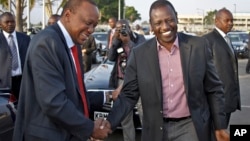UNITED NATIONS —
The African Union is pushing ahead with its bid for a one-year deferral of International Criminal Court charges against Kenya’s president and deputy president, saying it will move for a resolution in the U.N. Security Council.
A delegation of African foreign ministers met with the U.N. Security Council for informal discussions Thursday, seeking a deferral of the charges against President Uhuru Kenyatta and his deputy, William Ruto.
The two men are charged with instigating post-election violence in 2007 and 2008 that killed more than 1,100 people and displaced more than half a million others.
Speaking to reporters after the meeting, Ethiopian Foreign Minister Tedros Adhanom Ghebreyesus, who led the delegation, said the deferral is necessary because of concerns that Kenya could become destabilized if its leaders are away at trial and not focused on domestic matters.
“The situation in our corner of the world is not just a threat for that region, but it is for the international community, also," he said. "So we are asking the deferral because this is a serious threat to international peace and security in addition to our region, and we should prevent any havoc from happening in Kenya, because we don’t need another destabilized country in that part of the world.”
The Hague-based ICC announced Thursday that it has agreed to a three-month postponement to the start of President Kenyatta’s trial, which had been due to begin November 12. It will now start on February 5.
The U.N. Security Council has the power to issue what is known as an Article 16 deferral for ICC cases, but such a decision would require the agreement of all 15 Council members, and diplomats say members are currently divided on the issue. The Council has twice before declined to give a formal answer to the Africans when they sought a deferral in 2011 and then a termination of the Kenyan case in May.
The Ethiopian foreign minister said a one-year deferral would give the Africans time so they could engage with the Assembly of States Parties — the body that oversees the ICC — as well as with the Security Council in order to reach a solution.
He said they will soon put forward a resolution in the Security Council seeking the deferral.
Richard Dicker, International Justice Program director for Human Rights Watch, thinks the Council will likely reject the African request, fearful of creating what he called a “dangerous precedent." He also expressed concern about what could happen to witnesses who have been harassed.
“I think a number of Council members know full well that a delay for a year could be tantamount to a dismissal of the cases, given the intensive witness intimidation that has been going on against witnesses and the Kenyan authorities’ need to cease and desist on immediately.”
Dicker said he thinks it is important that the Security Council give the African Union a proper response this time, whether it is one they want to hear or not.
A delegation of African foreign ministers met with the U.N. Security Council for informal discussions Thursday, seeking a deferral of the charges against President Uhuru Kenyatta and his deputy, William Ruto.
The two men are charged with instigating post-election violence in 2007 and 2008 that killed more than 1,100 people and displaced more than half a million others.
Speaking to reporters after the meeting, Ethiopian Foreign Minister Tedros Adhanom Ghebreyesus, who led the delegation, said the deferral is necessary because of concerns that Kenya could become destabilized if its leaders are away at trial and not focused on domestic matters.
“The situation in our corner of the world is not just a threat for that region, but it is for the international community, also," he said. "So we are asking the deferral because this is a serious threat to international peace and security in addition to our region, and we should prevent any havoc from happening in Kenya, because we don’t need another destabilized country in that part of the world.”
The Hague-based ICC announced Thursday that it has agreed to a three-month postponement to the start of President Kenyatta’s trial, which had been due to begin November 12. It will now start on February 5.
The U.N. Security Council has the power to issue what is known as an Article 16 deferral for ICC cases, but such a decision would require the agreement of all 15 Council members, and diplomats say members are currently divided on the issue. The Council has twice before declined to give a formal answer to the Africans when they sought a deferral in 2011 and then a termination of the Kenyan case in May.
The Ethiopian foreign minister said a one-year deferral would give the Africans time so they could engage with the Assembly of States Parties — the body that oversees the ICC — as well as with the Security Council in order to reach a solution.
He said they will soon put forward a resolution in the Security Council seeking the deferral.
Richard Dicker, International Justice Program director for Human Rights Watch, thinks the Council will likely reject the African request, fearful of creating what he called a “dangerous precedent." He also expressed concern about what could happen to witnesses who have been harassed.
“I think a number of Council members know full well that a delay for a year could be tantamount to a dismissal of the cases, given the intensive witness intimidation that has been going on against witnesses and the Kenyan authorities’ need to cease and desist on immediately.”
Dicker said he thinks it is important that the Security Council give the African Union a proper response this time, whether it is one they want to hear or not.




